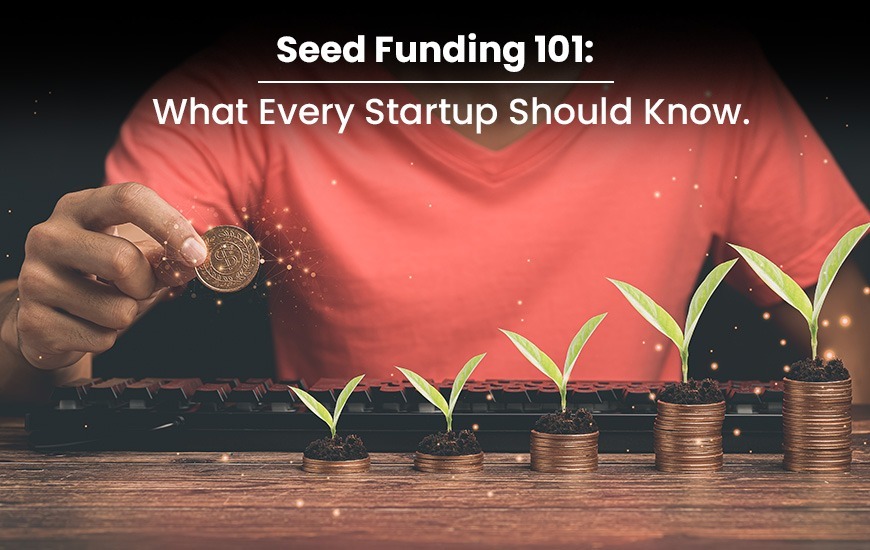
The journey a startup and its founder go through is full of hills, valleys, and mountains. The view might be great, but the path is not easy. And the first step is always a difficult one.
Likewise, in the startup world, establishing a startup is one of the most vital yet difficult jobs for entrepreneurs. However, with the funding, especially seed funding for your startups, kickstarting a startup can become streamlined. So, what are seed-stage investments, and how can startups secure them in the UAE? We will discuss it in this blog!
What is Seed Funding for a Startup?
If you are new to the startup world, this question might have popped up in your head. Let’s understand the concept of funding first. During the initial stages, a startup is nothing more than an innovative idea in the entrepreneur’s head. The process of converting that idea into business requires validation and research to ensure there is a customer base willing to interact with their service to make the company profitable. Like plant seeds need nurturing from water and fertilizers, a startup needs nurturing with seed funding and research to grow into a thriving business.
So, seed funding is the first external investment a startup gains from sources like angel investors, government grants, incubator programs, or early-stage venture capital firms. These investors are making a high-risk investment considering the seed-stage startups lack considerable traction and reliable business models. Therefore, most of these investors, except for the government grant providers, non-profit incubators, and fee-based incubators, ask for equity shares in return for their investment. Startups should consider their valuation, the funding, and the investors’ support they are getting before diluting their equity share in the early stage. The average range lies between 10% to 20%.
What is the Use of Seed Funding for your Startups?
Seed funding helps the startup lay the foundation of the business. From idea validation to building a business model, raising seed capital can help you boost your startup growth.
Following are a few things facilitated by the seed stage investments:
Research for product-market fit:
The startup should validate their idea through market research for their idea and analyze the market trends in their industry. The research includes customer analysis to find the right target audience to get market traction. The product-market fit check is crucial because it holds the future of your startup and saves you from joining the 35% of startups that fail due to a lack of market demand.
Developing an MVP:
A startup needs its product/services to test the market and raise the growth stage funding. The seed capital for startups helps them create prototypes and develop them into a Minimum Viable Product (MVP).
Hiring the team for a startup:
A startup needs a reliable and skilled team to streamline its operations and execute the business plans.
Building industry relationships:
Connections can take a startup a long way. From finding reliable partners to securing pitching opportunities and referrals, networking and building industry relationships are crucial for startup growth.
Facilitating future fundraising process:
Securing seed funding for a startup from reputed investors or huge funding helps them create a good market image and improves their chances of securing funds in the future.
What is the Startup Seed Funding Process in the UAE?
So, we discussed the meaning and role of seed-stage investments for startups. In a competitive market like the UAE, seed funding can give a startup the push to overcome competition, especially if reliable angel investors or incubators like Hub71 are investing in it, which recently announced its Cohort 15, including 21 startups, raised $130 Million (source). But how do you secure seed capital for startups? We can help with that! Following is the ideal startup seed funding process:
Preparing for raising seed capital
To raise seed funding for a startup, a founder must understand their startup idea, define their funding needs, and create a business plan and pitch. We know it may sound like a tedious and confusing task, but it lays the ground for your startup operations and fundraising strategies.
While you don’t have to be crystal clear, a firm decision can help you be confident and answer the investor’s panel efficiently. Your priority is to research the market demand and create a business plan to build a business for your audience. Based on the plan, you can estimate the funds required to succeed and form a compelling pitch for seed-stage fundraising.
Finding investors for pitching
Finding the right investor can be tricky, considering the competition in the UAE. However, you can filter the list of investors based on your startup’s funding needs, credentials, equity dilution, and the expertise of the investors. If you are in a competitive industry, the guidance of the investor can help you make the right decision.
Leveraging your network for referrals and pitching opportunities
Networking is the key to a successful business, whether you are in the early stage or the maturity. Networking can help you create strategic relationships, find investors, and make reliable connections for support. By leveraging yo network, you can validate your idea and tap into some pitching opportunities to reliable investors.
Furthermore, having strong industry relationships can help you get referrals for a competitive advantage in securing seed funding for a startup. Startup networking events like the International Investors Summit or other industry-specific events in the UAE are good places to build your network.
Pitching the startup to investors
When pitching a startup, you must be concise with the information you bombard the investors with. Keep the tone and narrative engaging, and be authentic with your stats and facts. As a seed-stage startup, you need to focus on highlighting the product-market fit, scalable business model, and potential profits. Before you pitch, ensure all your legal documents are in place because following the pitch comes the due diligence to check the authenticity of your startup.
Negotiating the deal for seed-stage investments
During the pitching, the discussion regarding the investment and equity dilution will take place. Discuss the terms and negotiate a good deal before finalizing the investment details.
Conclusion
Seed funding is crucial for the growth of a startup. Seed stage investments are used to lay the ground for the startup by financing the resource, market validation, product development, and getting guidance from investors. Raising seed capital requires an understanding of your startup and its needs regarding funds and guidance.
Create a business model to show the scalability of the startup and future profits. Leverage your network to find reliable investors and get referrals for pitching your startup. Keep the pitch concise and add authentic data to gain investors’ trust. Negotiate the funding terms and conditions before putting the seal.
Stay tuned to the International Investors Summit for more resourceful content on the UAE startup ecosystem!
FAQs
1. What are the challenges of raising seed capital for startups?
The seed stage startups face many problems, especially when raising seed capital. The lack of market traction might be one of the most prominent reasons they face difficulty convincing investors. Furthermore, considering the early stage of the startup, the valuation becomes tricky and might raise a problem in determining the appropriate equity dilution for the funding. The early stage startups often fail to find the right product-market fit, leading to losses and even startup failure.
2. How to find seed funding for a startup?
Finding seed funding requires a strategic approach. Start by attending networking events and investor summits like the International Investors Summit, where you can connect with angel investors and venture capitalists. Leverage social media platforms to discover potential investors. Building a strong professional network is crucial—seek referrals from industry contacts or mentors. Additionally, prepare a compelling pitch deck and business plan to attract investors who align with your vision and goals
3. What is the typical seed funding amount for startups?
The typical seed funding amount varies depending on the industry, location, and startup’s requirements. In general, startups raise between $100,000 and $2 million during the seed stage. In regions like the UAE, this amount is influenced by the scale of the startup’s vision and the investors’ risk appetite. Startups should clearly define their funding needs and articulate how the capital will be utilized to justify the amount they want from potential investors.
4. Can startups raise seed funding without any product?
Yes, startups can raise seed funding without a product, but it requires a strong presentation of their idea and vision. Investors look for a compelling business plan, extensive market research, and a clear problem-solution alignment. Highlighting the expertise of the founding team and demonstrating market demand can also bolster confidence. While challenging, startups with unique value propositions and well-researched strategies can attract investors even without a minimum viable product (MVP).





